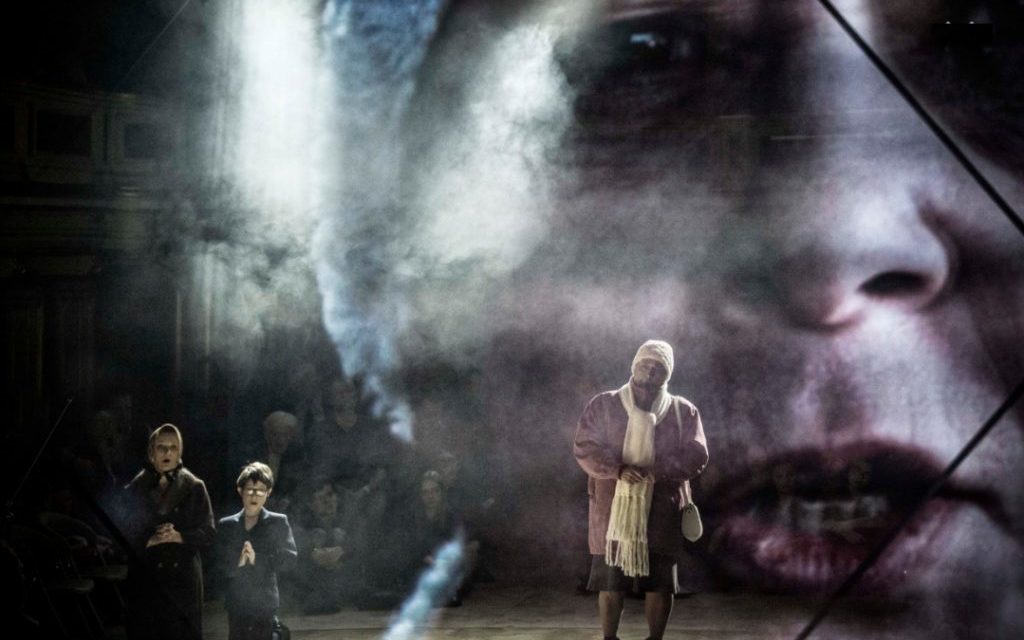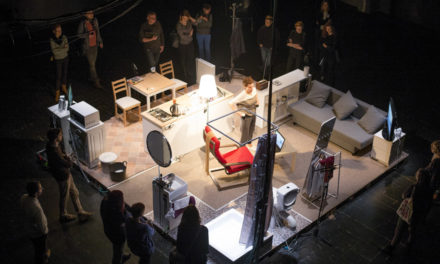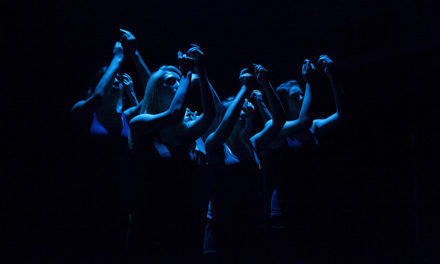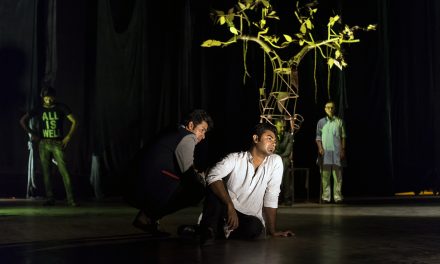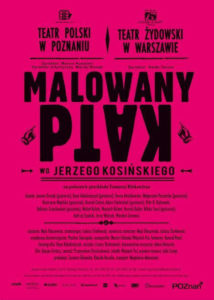 The Polish Theatre in Poznan / The Jewish Theatre in Warsaw
The Polish Theatre in Poznan / The Jewish Theatre in Warsaw
The Painted Bird, based on a novel by Jerzy Kosiński
Directed by: Maja Kleczewska
Dramaturgy: Łukasz Chotkowski
Set design: Marcin Chlanda, Wojciech Puś
Choreography: Kaya Kołodziejczyk
Music: Cezary Duchnowski
Premiere: March 26th, 2017
More information about the performance at: http://teatr-polski.pl/spektakle/malowany-ptak
From the reviews:
“Published in the United States in 1965, The Painted Bird by Jerzy Kosiński is a famous novel about a Jewish boy who suffers from extreme violence while seeking shelter among Polish Catholic peasants during World War II. Initially, it was assumed that it was an autobiography of Kosiński, yet later it turned out that the story was probably fictional and quite possibly not written in English. There were also rumours that Kosiński was working with translators and maybe even ghostwriters.
“Kleczewska is not staging the actual novel, she is rather telling its story. She presents events and emotions from two different points of view. The dispute takes place between the writer’s biographer (the inspiration for this character was Joanna Siedlecka, the author of The Black Bird, in which she unmasks the truth about The Painted Bird) and Jerzy Kosiński. The character of the writer is represented on stage by three persons — played by two actors of the Jewish Theatre (Henryk Rajfer and Jerzy Walczak) and by a young boy. The whole thing looks like a court case — the biographer acts as a public prosecutor and claims that the facts presented in the book are deviating from the truth, and Kosiński defends his novel. He also defends the truth of art that, according to his opinion, does not necessarily reflect facts; it only has to reflect moods and feelings.”
— Witold Mrozek, Gazeta Wyborcza online
Fuck… Sceny buntu (Fuck… Scenes of Rebellion)
Directed by: Marcin Liber
Set design: Mirek Kaczmarek
Live music: RSS BOYS
Dramaturgy: Krzysztof Szekalski
Premiere: March 25th, 2017
More information about the performance at: http://www.laznianowa.pl/history/info/fotorelacja:fuck-sceny-buntu
From the reviews:
“The inspiration of the texts was drawn from two events. Do you remember the case of Ryszard Siwiec and his act of self-immolation in 1968, in protest against the Warsaw Pact invasion of Czechoslovakia? Have you ever heard about the group called Fuck the Forest and the famous documentary directed by Michał Marczak? These two disparate manifestations of rebellion stand behind the inspiration for the performance. Political rebellion with the shocking gesture of sacrificing one’s life versus youth rebellion. Rebellion as an experiment in the search for identity in the period of entering adulthood – says the director Marcin Liber.”
— Marta Gruszecka www.cojestgrane24.wyborcza.pl
“The phenomenon of rebellion described by Liber shows rather more tendency to decay than to settle down. Once united society is becoming increasingly divided today. What was once the source of strength is now bringing society back down to earth. But who is responsible for the pauperization of the progressive factors? Those who protest, or the contemporary world, which sells rebellion in packages, which obviously look too pretty? The characteristic figures of Guerrilla Girls appear on stage for a short while during the performance. That is all that the director has to say about feminism – someone declares, after this short part with women wearing gorilla masks. Everything that had been truly revolutionary was overcome and marginalized by the image created by the media, leaving only masks.”
— Łukasz Badula www.kulturaonline.pl
 The Zygmunt Hübner Powszechny Theatre
The Zygmunt Hübner Powszechny Theatre
The Curse
Directed by: Oliver Frljić
Dramaturgy: Agnieszka Jakimiak, Joanna Wichowska and Goran Injac
Lights: Jacqueline Sobiszewski
Premiere: February 18th, 2017
More information about the performance at: http://www.powszechny.com/spektakle/klatwa,s1141.html
From the reviews:
“The Curse, a performance based on a drama by Stanisław Wyspiański, directed by Oliver Frljić triggered a media and political storm throughout Poland. Abusive remarks and insults were being hurled at the theatre management, the director and the cast. However, the audience was delighted and the courage of the actors was welcomed with great applause. What has happened in Warsaw proves very clearly how deeply divided is the Polish society and what is the role of the government in this situation. (…)
“In order to describe and understand this scandal, it is necessary first to devote a bit of space to the performance and its assumptions. The performance is based on The Curse, written by Stanisław Wyspiański, but only a few scenes originating from the drama have been directly presented on stage. Wyspiański was one the most well known Polish artists, he could be described as a father of the Polish modernism. His dramas are a painful analysis and a description of a divided Polish society, unable to act together, with no conflict. The Curse (which premiered in 1909) tells a story of a Catholic priest who lives with a woman and their kids. When the village suffers from drought the villagers blame the priest’s mistress for their misfortune. Although from the contemporary point of view the text may sound a bit archaic, however the problem presented in a play is still an issue in Poland.
“The performance directed by Frljić is a cruel satire on the entire Polish society, with no exceptions. It refers to the members of the clergy, the politicians but also the intelligentsia and the artists. It touches upon various current issues, such as refusal to take in refugees, fear of Muslims (one of the actors shouts: “Not all Muslims are terrorists, but all terrorists are Muslims”), a ban on abortion (one of the actresses speaks about going to The Netherlands to get an abortion). The actors are dressed in cassocks. In one of the scenes they make rifles of wooden crosses and pretend that they shoot the audience. They pray and the audience hears the Polish national anthem.”
— Natalia Staszczak-Prüfer, Nachtkritik
The Year of the Avant-Garde
This year we are celebrating the centennial of the avant-garde. The opening of the first exhibition of Polish Expressionists at the Cracow Society of Friends of Fine Arts in November 1917 is considered to be a symbolic birthday of the avant-garde. The celebrations were initiated by the three important museums – the National Museum in Warsaw, the National Museum in Cracow and the Museum of Art in Lodz. Over 50 museums and cultural institutions from all over Poland have also prepared special programs and exhibitions on this occasion. The Zbigniew Raszewski Theatre Institute will carry out various artistic and educational events within the frames of the project “The Reclaimed Avant-Garde”. The most important goal of these events is to disseminate knowledge about less known achievements of the Polish theatre avant-garde of the twentieth century. The main event will be an international conference to be held in Warsaw in November 2017.
Finalists of the Gdynia Dramaturgy Award
The Competition Jury of the Gdynia Dramaturgy Award has nominated this year’s finalists. The winner will be announced on May 27th, during the 12th edition of R@port Festival of Polish Contemporary Plays.
The following literary texts have been nominated:
Koniec przemocy (The end of violence) by Bogna Burska and Magda Mosiewicz,
Słabi. Ilustrowany banał teatralny (Weak people. Illustrated theatre cliché) by Magdalena Drab,
Wszystko o mojej matce (All about my mother) by Tomasz Śpiewak,
Błąd wewnętrzny (Internal error) by Anna Wakulik,
Piekło-Niebo (Hell – Heaven) by Maria Wojtyszko.
The Silver Lion Goes to Maja Kleczewska
The director Maja Kleczewska has been awarded The Silver Lion for innovation in theatre. Her performance Rage, based on a novel by Elfriede Jelinek, originally staged at the Zygmunt Hübner Powszechny Theatre in Warsaw will open La Biennale di Venezia on July 25th.
R@port Festival of Contemporary Polish Plays
May 20th – May 27th, 2017
Organizer: The Witold Gombrowicz City Theatre
Program Director: Jacek Sieradzki
http://www.festiwalraport.pl
This year, during the 12th edition of the R@port Festival the audience will have a chance to see, as usual, various adaptations of the Polish contemporary literary texts. The Festival will be inaugurated by the performance “with a positive message” as the critics say, i.e. Triumph of the Will by Monika Strzępka and Paweł Demirski, originally staged at the Stary National Theatre in Cracow. The program of the festival includes, among others: Żony stanu, dziwki rewolucji, a może i uczone białogłowy (Stateswomen, Sluts of Revolution, or the Learned Ladies) (touching upon a subject of equality and non-discrimination) by Jolanta Janiczak (a laureate of the Gdynia Dramaturgy Award 2016), directed by Wiktor Rubin, Krzywicka/Krew (Krzywicka/Blood) by Julia Holewińska, directed by Alina Moś-Kerger, as well as Drugi Spektakl (The Other Show) directed by Anna Karasińska.
Malta Festival Poznan
June 16th – June 25th, 2017
Organizer: Malta Foundation
Director: Michał Merczyński
Curators: Oliver Frljić and Goran Injac
http://malta-festival.pl/en
This year’s edition of Malta Festival will be held under the motto “The Balkans Platform”. The curators are a Croatian director Oliver Frljić and a Serbian dramaturg Goran Injac. They are going to present contemporary art created by the artists from the region of the former Yugoslavia. The program includes, among others: a performance Turbofolk directed by Oliver Frljić and a concert of a Slovenian music group Laibach. “We have tried to choose a program that would be conceptual and possibly the least theatrical. We play with stereotypes, we act in opposition to the expected image of the Balkans,” says Goran Injac.
Editor’s Note: “Poland on Stage” is a publication of Instytut Teatralny im. Zbigniewa Raszewskiego and has been reposted here with permission.
This post was written by the author in their personal capacity.The opinions expressed in this article are the author’s own and do not reflect the view of The Theatre Times, their staff or collaborators.
This post was written by Lauren Dubowski.
The views expressed here belong to the author and do not necessarily reflect our views and opinions.

